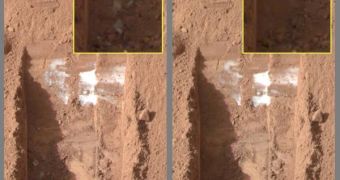A growing number of space experts believe that they may have been going about finding life on Mars the wrong way. They argue that landers such as the twin Vikings and the Phoenix Mars Lander may have unwillingly destroyed the very chemicals they were looking for in the Martian soil, by heating them up in their internal ovens. Finding organic compounds on the Red Planet is one of the main reasons space agencies wanted to put a lander or rover there in the first place. If this class of molecules is discovered, then it could mean that some form of life existed on Mars at some point.
Since the Vikings revealed no sign of organics on Mars, NASA stopped sending landers to the planet for the next twenty years. However, in time, geologists and planetary scientists came to realize that, even if life did not create any organic chemicals, then nature certainly could have done so. They argued that the large numbers of comets and asteroids that battered the planet could have sent up at least some amounts of these molecules in the planet's atmosphere. However, absolutely no sign of organics was ever found. When Phoenix finally touched down, in 2008, it discovered the reason for this – perchlorate salts.
In addition to proving the existence of ice under a thin layer of sand, the lander also failed to produce evidence of organic materials in its surrounding areas. Now, researchers believe that the ovens used by the lander were unable to pick up the chemicals because of their method of operation. They heat the soil samples to hundreds of degrees Celsius, and then analyze the gas that forms. However, organics may burn completely and avoid detection. This has been proven with similar ovens on Earth, in which organics and perchlorate salts were burned – no organic molecules were found, even though the researchers conducting the studies knew for sure they were there.
University of California in San Diego (UCSD) expert Jeffrey Bada said recently that one of the things future Mars missions could do would be to equip rovers or landers with ovens that did not burn the samples, but rather heated them up in water. The scientist added that he was the leader of a team developing such an instrument for the European Space Agency. ESA will mount the new device on its ExoMars mission, which will launch in 2016, NewScientist reports.

 14 DAY TRIAL //
14 DAY TRIAL //